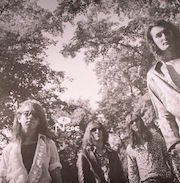Depending on who you listen to – and just make sure that it isn’t the godawful Dominic Sandbrook, a man whose grasp of popular culture could described as ‘slender’ at best – the decade that saw Reagan and Thatcher flush the post-war consensus down the u-bend of history was the point when the new gold dream of shiny synth pop consigned the guitar and rock & roll to gather dust in some mouldy corner. Blah, blah, blah…
Of course, it wasn’t like that at all. The 1980s was the point when rock & roll, having been reduced to its base elements and so reinvigorated by punk rock, took stock of itself and, while looking to the past as a jumping off point, actually went off on a variety of tangents. You only have to conjure up names such as The Cramps or The Gun Club or Tav Falco’s Panther Burns among many others to see that here were bands mutating the form like mould growing on a discarded slice of bread. Here was black humour, psychedelia, reverb, lashings of echo, plenty of top end shot through with B-movie imagery and fuelled with adolescent hormones and a glorious sense of delinquency. And, as evidenced by the likes of The Birthday Party and The Scientists – among many, many others – it wasn’t all coming from the States; the folks Down Under were more than adept at giving what they’d get.
This 4-CD box set – or 22-track compilation for the financially modest – is as good a history of the enduring appeal of rock & roll as you’re likely to find. The intervening years since their demise and the present day has seen The Scientists’ stock rise to a probably far greater degree than their mid-80s heyday. Formed in Perth, Western Australia, in 1978 around core member Kim Salmon, The Scientists’ career can be broken down into three distinct phases: the punk years, the post-Birthday Party influences and finally with the shadow of Captain Beefheart looming large. Which isn’t to suggest that The Scientists didn’t have their own sound – they did – but neither were they quite at the forefront of the action like some of their contemporaries were.
There remains an undisputed joy in being re-acquainted with the primitive charms of debut 45, ‘Frantic Romantic’, but the real treats are to be found in that mid-period that birthed gloriously trashy nuggets such as ‘Blood Red River’ and ‘Swampland’. As with so many bands of the period, the imagery of the swamp – all hanging vines, murk, mystery and big dollop of schlock-horror thrown in – looms large but despite support slots with The Gun Club among others, The Scientists never really broke through to a wider audience. But what they did do is leave behind a body of work that was picked up by subsequent generations and cited as highly influential.
There’s certainly much to enjoy here but there’s also plenty to re-affirm their cult status in the greater scheme of things.


